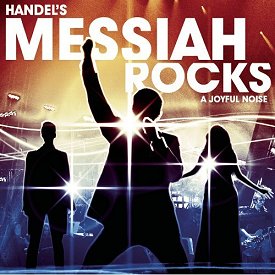| RECORDINGS |

|
| LABEL: |
SONY
CLASSICS |
| CATALOG
NUMBER: |
50243 |
| UPC
NUMBER: |
0886975024322 |
| NUMBER OF DISCS: |
1 |
| RUNNING TIME: |
55:42 |
| YEAR
RECORDED: |
2009 |
| CD
RELEASE DATE: |
OCTOBER
6, 2009 |
| CONDUCTOR: |
KEITH
LOCKHART |
| ORCHESTRA: |
THE
BOSTON POPS |
| CHOIR: |
UNKNOWN |
| SOPRANO: |
LACHANZE |
| CONTRALTO: |
N/A
|
| TENOR: |
MIG
AYESA |
| BARITONE: |
J.
ROBERT SPENCER |
|
|
|
DISC ONE
1. Overture
(Orchestra; Band) 3:11
2. Comfort Ye (Mig
Ayesa) 4:55
3. He'll Come In Glory
(LaChanze) 3:42
4. He Is Fire (J. Robert
Spencer) 4:20
5. Rejoice (Mig Ayesa;
LaChanze; J. Robert Spencer)
8:05
6. Behold the Lamb of
God (Mig Ayesa)
1:51
7. He Was Despised (J.
Robert Spencer) 5:19
8. He Trusted You
(LaChanze; Antoine Silverman)
4:13
9. King of Glory (Mig Ayesa)
3:26
10. He Is My Son (J.
Robert Spencer) 5:05
11. How Beautiful
(LaChanze) 3:28
12. Hallelujah (J.
Robert Spencer; LaChanze; MiG Ayesa)
4:24
13. A Child Is Born
(LaChanze; J. Robert Spencer; MiG Ayesa)
3:35
|
|
SITE RATING: 0/10
SITE
REVIEW: There are two
schools of thought about bringing classical
music to the "masses." The first
school, which Leonard Bernstein promoted
through programs like his Leonard
Bernstein:
Omnibus - The Historic TV Broadcasts , is to
educate people so that they could learn the
history, meaning, and power of great music,
expanding their appreciation and
knowledge; thereby "raising them up" to
the bar of high art. The second school
of thought is to "dumb down" the music to the
perceived level of the great unwashed,
lowest-common-denominator layman. The
first school is harder; it takes a master
teacher, patience, humor, and intelligence.
The second school is easier; it makes
everything loud, fast, and flashes bright
lights in order to "numb" the audience into a
slobbering, dead-eyed pool of sludge. It
was this second school of thought that created
Messiah
Rocks! Screaming
guitars, thundering drums, banshee-wailing
soloists, and mindless sing-alongs, stripping
Handel's masterpiece of feeling, inspiration,
and art, and turning it into banal
Christian-lite pop-rock. In truth, there
is very little of Handel's Messiah
to be found here - it's only been sampled -
you'll hear fits and starts of it between the
entirely forgettable Christian pop songs.
The soloists, pulled from the "Disney
Princess" roster and Broadway, have certainly
learned to belt; but have mistaken volume for
passion. Keith Lockhart, poster child
for classical banality, is a slave to the
producer's MTV-inspired vision, while
everything sung and played withers and dies
before the real Messiah. , is to
educate people so that they could learn the
history, meaning, and power of great music,
expanding their appreciation and
knowledge; thereby "raising them up" to
the bar of high art. The second school
of thought is to "dumb down" the music to the
perceived level of the great unwashed,
lowest-common-denominator layman. The
first school is harder; it takes a master
teacher, patience, humor, and intelligence.
The second school is easier; it makes
everything loud, fast, and flashes bright
lights in order to "numb" the audience into a
slobbering, dead-eyed pool of sludge. It
was this second school of thought that created
Messiah
Rocks! Screaming
guitars, thundering drums, banshee-wailing
soloists, and mindless sing-alongs, stripping
Handel's masterpiece of feeling, inspiration,
and art, and turning it into banal
Christian-lite pop-rock. In truth, there
is very little of Handel's Messiah
to be found here - it's only been sampled -
you'll hear fits and starts of it between the
entirely forgettable Christian pop songs.
The soloists, pulled from the "Disney
Princess" roster and Broadway, have certainly
learned to belt; but have mistaken volume for
passion. Keith Lockhart, poster child
for classical banality, is a slave to the
producer's MTV-inspired vision, while
everything sung and played withers and dies
before the real Messiah.
|
|


